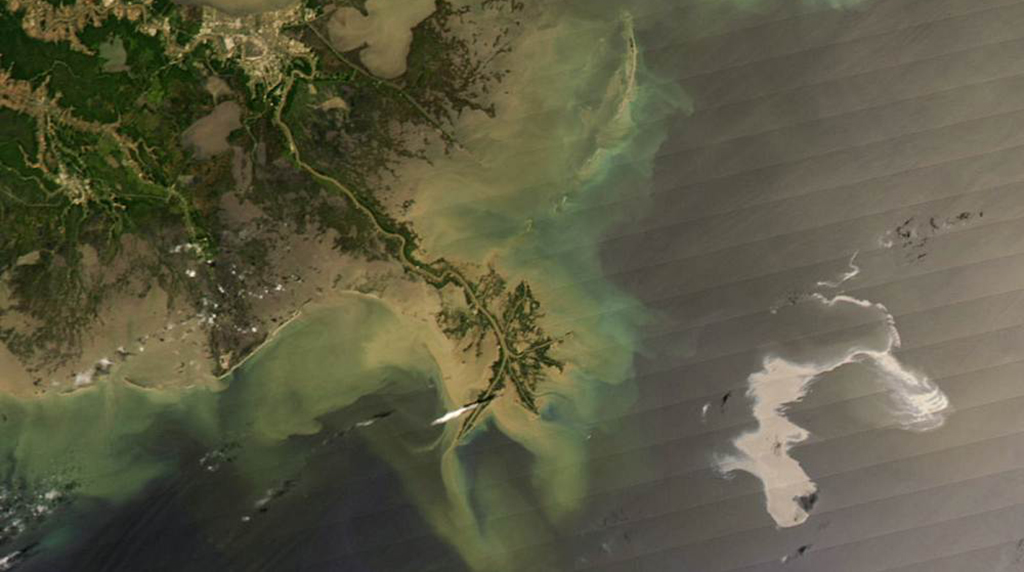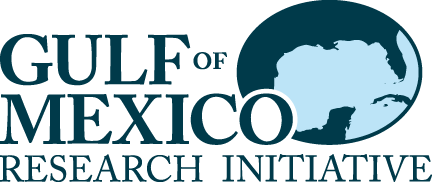The following summary is taken directly from the Gulf of Mexico Research Initiative (GoMRI) website. Additional detailed information about GoMRI can be found here.
On 20 April 2010, the Deep Water Horizon (DWH) drilling rig operating approximately 50 miles (80 km) off the coast of Louisiana experienced a catastrophic failure that resulted in the release of petroleum (oil and gas) and subsequent explosion and fire, the ultimate sinking of the rig, and a discharge of gas and light sweet crude oil from an ocean depth of nominally 5000 feet (1525 m). This tragic event was overshadowed with the loss of 11 men who were working on the rig at the time of the explosion.
The DWH spill was likely the largest in US history. The large oil and gas volumes released during the spill are part of a series of petroleum-related impacts suffered by the Gulf of Mexico, including the IXTOC I spill in 1979, the large-scale oil spillage during Hurricanes Katrina and Rita, and the chronic annual releases due to ship activity, industry activity, and human use.
The DWH spill resulted in petroleum and dispersants entering the Gulf of Mexico at varied concentration levels vertically and laterally, with a yet-to-be-determined impact on the ecosystems.
On 24 May 2010, BP committed $500 million over a 10-year period to create a broad, independent research program to be conducted at research institutions primarily in the US Gulf Coast States. On 15 June 2010, BP announced the names of the scientific experts who would form GoMRI’s independent Research Board. BP, in consultation with the White House and the Governors of the five Gulf Coastal States, later expanded the GoMRI Research Board to 20 members by adding additional free fonts scientific expertise. The GoMRI Research Board has 20 members, 10 appointed by BP and 2 recommended by the Governor of each of the five Gulf Coast States and appointed by the Gulf of Mexico Alliance.
BP provided GoMRI Year 1 (1 June 2010 – 31 May 2011) funds to Gulf Coast State institutions for rapid-response studies in the immediate aftermath of the DWH oil spill. Subsequent GoMRI funds have been used to support research programs for both consortia and individual investigators. The annual funding level for all GoMRI activities will be $50 million per year.
The objectives of the GoMRI are to investigate the impacts of the oil, dispersed oil, and dispersant on the ecosystems of the Gulf of Mexico and affected coastal States in a broad context of improving fundamental understanding of the dynamics of such events and the associated environmental stresses and public health implications. The GoMRI will also fund research into improved spill mitigation, oil and gas detection, characterization, and remediation technologies. The ultimate goal of the GoMRI is to improve society’s ability to understand, respond to, and mitigate the impacts of petroleum pollution and related stressors of the marine and coastal ecosystems, with an emphasis on conditions found in the Gulf of Mexico. Knowledge accrued will be applied to restoration and to improvement of the long-term environmental health of the Gulf of Mexico.
ECOGIG is supported by:
Other GoMRI Consortia
ADDOMEX
ACER
CARMMHA
CARTHE
C-IMAGE-II
C-MEDS
CONCORDE
CRGC
CSOMIO
CWC
DEEPEND
DEEP-C
DROPPS
ECOGIG (that's us!)
GISR
LADC-GEMM
RECOVER
GoMRI Leadership and Board
Chuck A. Wilson, PhD
GoMRI Chief Scientific Officer
Louisiana State University
Rita R. Colwell, PhD
Research Board Chair
Distinguished Professor
University of Maryland College Park and
Johns Hopkins University Bloomberg School of Public Health
Margaret Leinen, PhD
Research Board Vice Chair
Associate Provost for Marine and Environmental Initiatives of Florida Atlantic University
Executive Director of Harbor Branch Oceanographic Institute
Debra S. Benoit, MEd
Director of Research and Sponsored Programs
Nicholls State University
Peter G. Brewer, PhD
Senior Scientist
Monterey Bay Aquarium Research Institute
Richard E. Dodge, PhD
Professor, Dean, Nova Southeastern University Oceanographic Center
Executive Director, National Coral Reef Institute
John W. Farrington, PhD
Provost and Vice Chancellor for Academic and Student Affairs
University of Massachusetts-Dartmouth
Kenneth M. Halanych, PhD
Alumni Professor & Coordinator, Marine Biology Program
Auburn University
David Halpern, PhD
Senior Research Scientist, California Institute of Technology/NASA Jet Propulsion Laboratory
William T. Hogarth, PhD
Regional Chancellor, University of South Florida-St. Petersburg
Director, Florida Institute of Oceanography at the University of South Florida
Cecilie Mauritzen, PhD
Chief Scientist, Water & Climate
NIVA – Norwegian Institute for Water Research
Raymond L. Orbach, PhD
Director
Energy Institute at The University of Texas at Austin
Jürgen Rullkötter, PhD
Professor of Organic Geochemistry
Institute of Chemistry and Biology of the Marine Environment (ICBM)
David R. Shaw, PhD
Vice President for Research and Economic Development
Mississippi State University
Richard F. Shaw, PhD
Associate Dean, School of the Coast & Environment
Professor, Department of Oceanography and Coastal Sciences
Louisiana State University
John Shepherd, PhD
Professorial Research Fellow
School of Ocean & Earth Science, National Oceanography Centre
University of Southampton
Bob Shipp, PhD
Chair, Department of Marine Science
University of South Alabama
Burton Singer, PhD
Courtesy Professor
Emerging Pathogens Institute
University of Florida
Ciro V. Sumaya, MD, MPHTM
Professor, Health Policy and Management
Cox Endowed Chair in Medicine
Founding Dean, School of Rural Public Health
Texas A&M Health Science Center
Denis Wiesenburg, PhD
Provost
The University of Southern Mississippi
Dana Yoerger, PhD
Senior Scientist
Woods Hole Oceanographic Institution



















 back to top
back to top